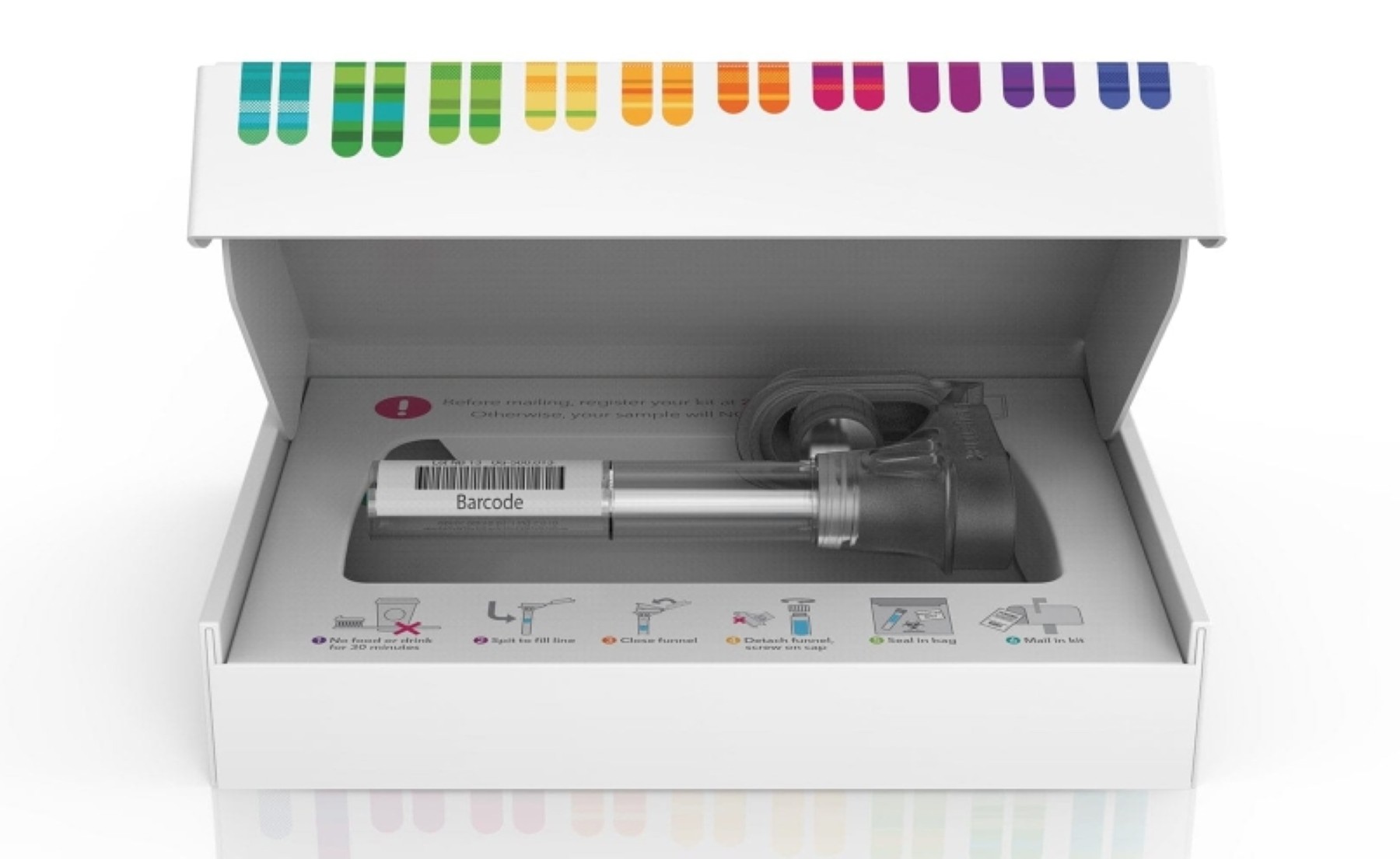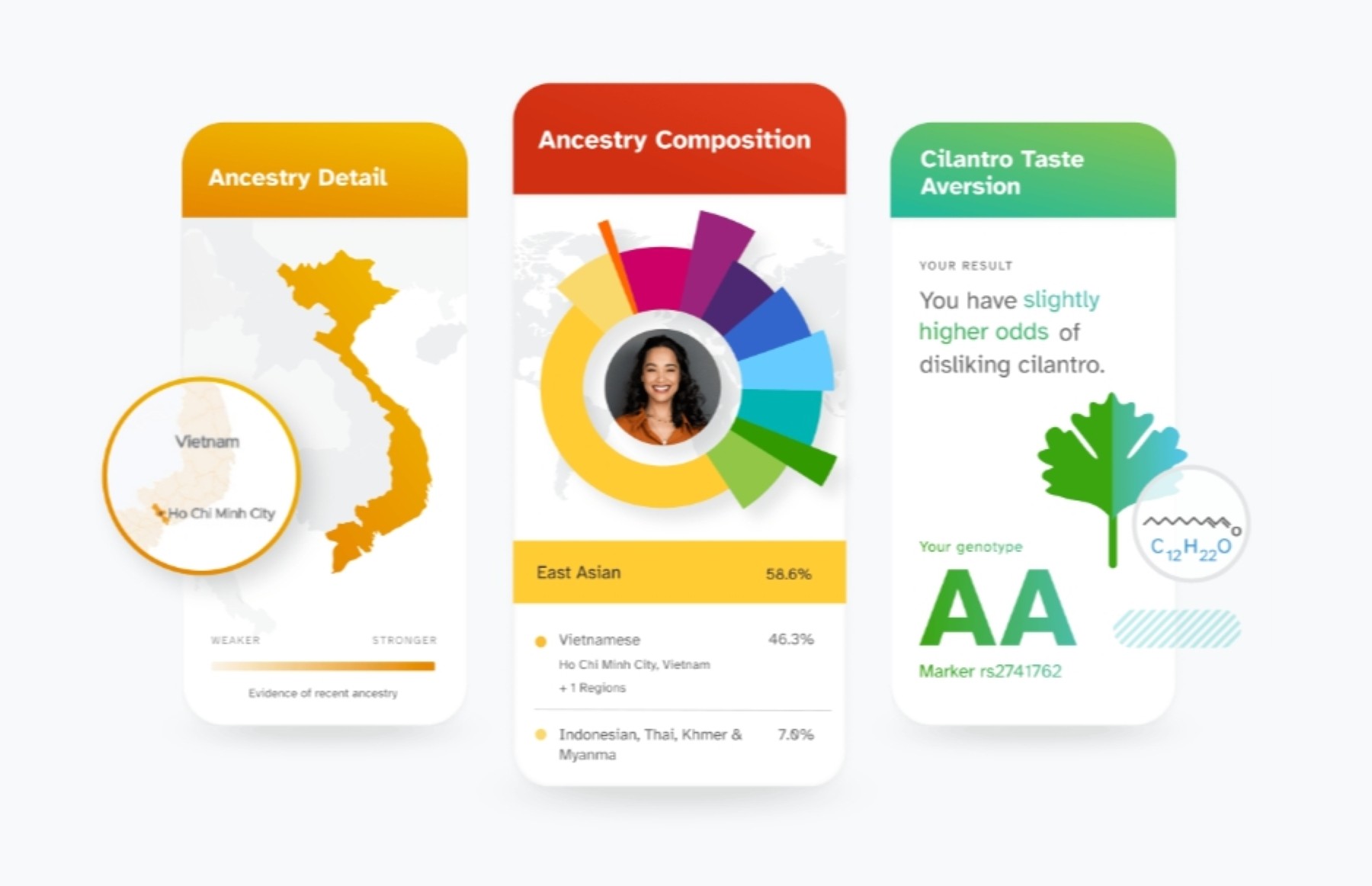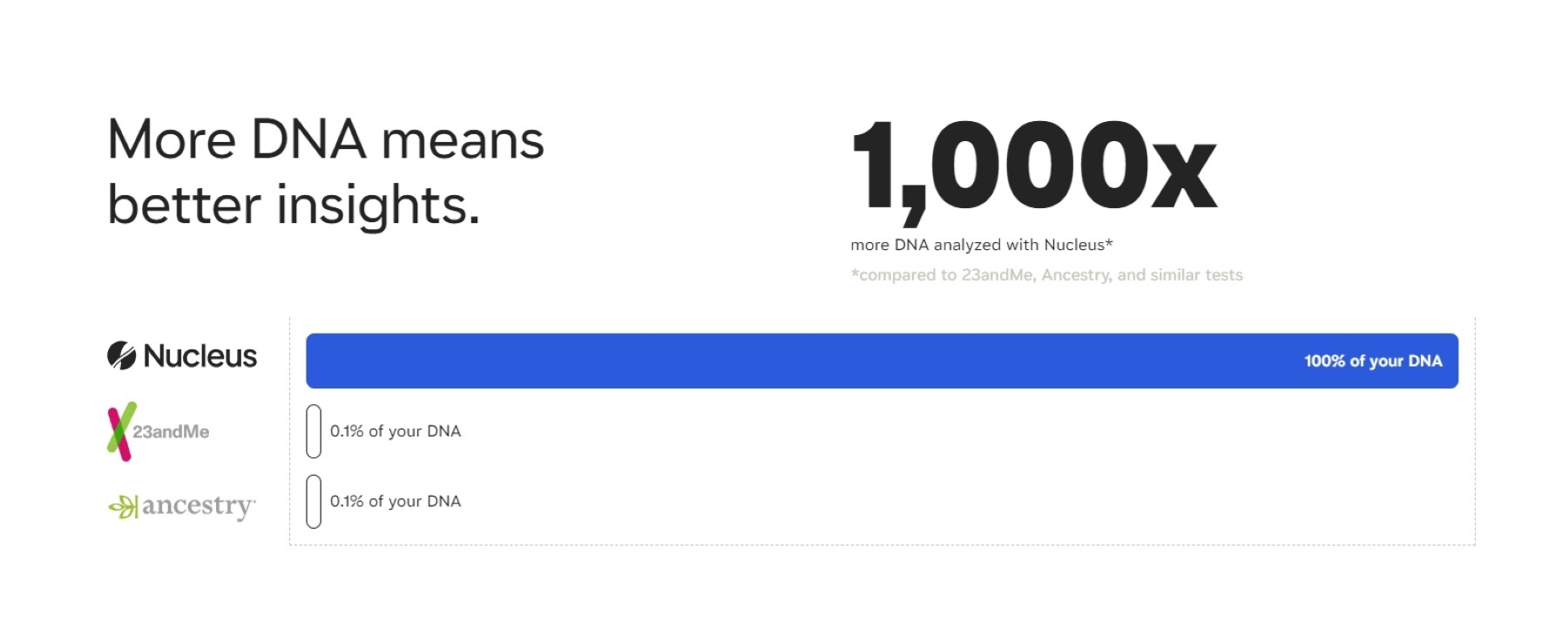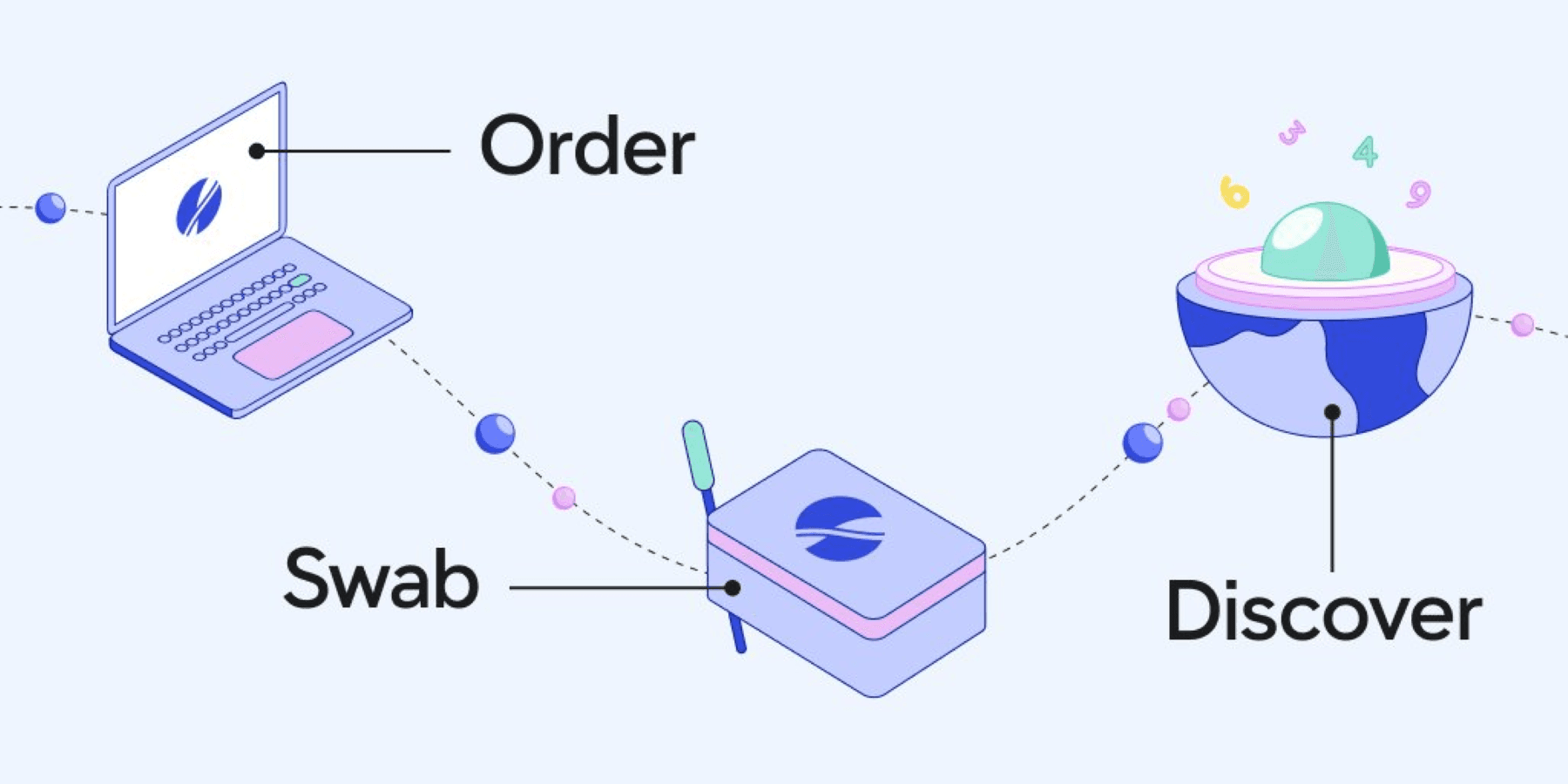Consumer genetics has grown tremendously in the past decade, and 23andMe is undoubtedly one of the more recognizable names in the industry. The DNA testing platform appeals to many users primarily because it offers ancestry analyses and genetics-informed health reports. That brings us to the question: are these services as insightful as they seem?
The truth is that 23andMe’s analyses are incomplete — the company’s underlying DNA testing technology often impacts the quality of its reports. You may also want to assess the platform based on other criteria, such as the availability of genealogical records or pricing.
This comprehensive 23andMe review will give you unbiased insights into what the service offers and whether it’s worth your money. Our experts will also dig into users’ opinions, especially in light of the 2023 security incident, and dissect the company’s security measures.
23andMe: An overview
Founded in 2006, 23andMe is one of the oldest direct-to-consumer (DTC) genetic testing services. Its name reflects the fact that each human cell can be organized into 23 chromosome pairs.
23andMe’s service is convenient — you receive an at-home kit and collect your saliva sample. After you mail it back, you can expect your personalized ancestry and/or health reports within four to six weeks, all accessible via your online account.

Source: 23andMe
Like most DTC testing services, 23andMe uses genotyping technology to process your DNA sample. Genotyping analyzes specific areas in your DNA sequence to identify variants — or genetic differences — that make you unique.
While it’s not the most advanced technology available today, 23andMe uses it to detect variants linked to common health conditions, traits, and ancestry.
23andMe genetic testing review: 5 aspects to consider
Our review of 23andMe will tackle five aspects most likely to influence your decision-making. Follow the sections below to get a complete picture of this genetic testing service:
Ancestry analysis
Health analysis
Data privacy and security
Pricing
Customer service
1. Ancestry analysis
23andMe outlines your ancestry composition and ethnicity estimate by comparing your DNA to that of 14,000+ people from around the world. The platform may have an edge over similar services because it has one of the larger reference populations, with datasets spread across 47 populations and 3,000+ regions.
23andMe gives you access to 80+ personalized reports (including 30+ genetic trait reports) that help you understand your ancestry better. Some of the standout elements of its analyses include:
An interactive map
Historical matches (if available)
DNA relatives from the database (optional)
One of the most interesting features of 23andMe’s ancestry service is its haplogroup analysis, which reveals the migration pattern of your maternal and paternal-line ancestors dating back thousands of years.
Note: Paternal haplogroups can be calculated for male customers only.

Source: 23andMe
Accuracy of 23andMe’s ancestry reports
The platform lets you view your ancestry reports with confidence thresholds in the 50–90% range, with 90% indicating high accuracy. Based on user opinions, though, the results can be hit or miss. In general, 23andMe’s continental-level breakdowns are usually spot on, but the regional grouping may contradict your personal knowledge or perception. The results also tend to be more accurate for some regions than others.
Here’s what one user had to say about the legitimacy of their results:
“23andme gave me a whopping 45.7% British & Irish with mostly Irish counties lit up, while my French & German was at 9.7%. Doesn't quite track with my family history (half Jewish, half French-Canadian), so I assume most of my French got miscategorized as Irish…”
2. Health analysis
23andMe offers a variety of reports based on the known genetic variants identified in your DNA sample. You can find dozens of reports under the following categories:
While the breadth of reports is impressive, most of these options are only available with the pricier 23andMe subscriptions — Premium and Total Health. It’s also worth noting that the health service is not available in several locations, such as Australia, Germany, and Singapore.
Accuracy of 23andMe’s health reports
While informative to a degree, 23andMe’s health insights should be taken with a grain of salt. The company warns that the health reports contain false positives or false negatives because of the limitations of its genotyping technology.
Genotyping reads only about 0.1% of your genome (which refers to all of your DNA). As a result, the data identified and interpreted is incomplete. 23andMe also offers exome sequencing on its most expensive plan, but the results are still limited because the technology can read only about 1–2% of your genome.
A common misconception among users is that 23andMe’s health reports are FDA-approved. However, the platform clarifies that only some of its reports meet the FDA requirements for clinical validity.
Tip: If you are looking for breath and accuracy in health-focused DNA testing, it’s best to go for services that use advanced technology like whole-genome sequencing to analyze nearly 100% of your genome. The most affordable and accessible option in the U.S. is Nucleus — a platform that analyzes your entire DNA, covering 1,000 times more data than services like 23andMe.
Nucleus health reports are clinically validated and analyze genetic variants with 99.9% accuracy. Order your Nucleus at-home DNA test kit to access high-quality DNA testing!
3. Data privacy and security
23andMe claims to be privacy-conscious and follows all industry-standard data security and privacy regulations. Despite the precautions, the platform suffered a data breach in 2023, which has made many customers wary about using the service.
Some sources report that the breach compromised around 6.9 million accounts, but 23andMe claims the number is closer to 14,000. The incident impacted the platform’s reputation as data from at least a million profiles ended up being sold on the dark web.
Since then, the company claims to have fortified its security by measures such as requiring two-factor authentication and password resets for all existing users.
4. Pricing
23andMe offers both one-time and membership-based services at different price points. Refer to the following table to assesses the cost-benefit factor for various packages:
23andMe’s ancestry service is affordable compared to similar platforms like AncestryDNA and MyHeritage. The same can’t be said for the health-based packages, though. They seem overpriced, considering there are 23andMe alternatives offering advanced genetic tests at lower price points. Additionally, many users aren’t too enthusiastic about paying for vague health reports—here’s what one customer had to say:
“The information I got was super vague — you have a typical likelihood of developing etc. etc. — for almost everything and expectedly so for the price compared to a more in depth service.”
5. Customer service
Many 23andMe customer reviews and complaints focus on the quality of service and support. The platform has relatively poor service ratings that contrast with its popularity. For instance, you can find numerous 23andme reviews on Trustpilot and ConsumerAffairs covering grievances like:
Results being late or not arriving at all
Limited customer support
Unexpected subscription charges
Locked user accounts (especially after the 2023 security incident)
Bonus read: Find out how 23andMe compares to other DNA testing services:
Final thoughts: Should you use 23andMe?
To sum up various 23andMe reviews, here’s what the platform’s pros and cons look like:
23andMe offers a simple and accessible way to satiate your genealogical curiosity with rich ancestry data. Still, its health packages leave a lot to be desired as they can be considered too expensive for the limited insights they offer.
If you want better health insights, you may want to move away from services like 23andMe that rely on outdated genotyping technology to study only a fraction of your genome. A smarter alternative is to choose Nucleus — an all-in-one DNA health test that uses whole-genome sequencing to read all your DNA.
Unlike genotyping-based tests that look at only about 700,000 DNA locations, Nucleus analyzes more than 6 billion DNA variants for complete self-discovery. From more precise genetic traits and health predispositions to hereditary carrier genes you might pass on to your kids, Nucleus can uncover the unique insights that other tests tend to miss.

Nucleus: The best choice for actionable health insights
Nucleus is the most affordable clinical-grade whole-genome DNA platform in the U.S. It allows for the complete understanding of your health not only via personal genomics but also by considering your ancestry and even non-genetic information, such as age, blood pressure, and lifestyle habits.
Nucleus offers personalized and extensive genetic screening and multiple informative reports across different aspects, such as:
Heart health, common cancers, mental health conditions, and others
Rare and/or high-effect DNA variants — it’s important to be aware about these variants as they can be powerful enough to cause diseases and conditions on their own, but ironically, most tests don’t detect them
Genetic traits and IQ analysis
Carrier status for inheritable conditions (coming soon!)
What makes Nucleus unique are actionable health insights — the platform partners with SteadyMD to offer physician-ordered and clinical-grade testing. You can get expert genetic counseling based on your reports and understand what proactive measures will help you improve your and your family’s longevity and quality of life.
Nucleus is HIPAA-compliant and follows all privacy standards to protect your data. Its labs are fully regulated (CLIA-certified and CAP-accredited), and the testing takes place in the U.S. for enhanced security.
Own your health decisions: Get your Nucleus DNA kit
Nucleus’ at-home test kit is easy to use. Once you receive your kit, you only need to swab your cheek and ship your sample back. The waiting time is around six weeks.
The whole-genome sequencing kit is available with Nucleus Premium, priced at [PRICE.KIT_SOLO.ONE], and includes every genetic report Nucleus offers. The platform also offers ongoing health insights based on changes in your lifestyle factors as well as new research.
Here’s how to order your Nucleus DNA testing kit:
Add your personal details
Place your order

Source: @NucleusGenomics via X
You may also like
Check out our detailed reviews and comparisons of popular DNA testing kits below:
Featured image source: Louis Reed












